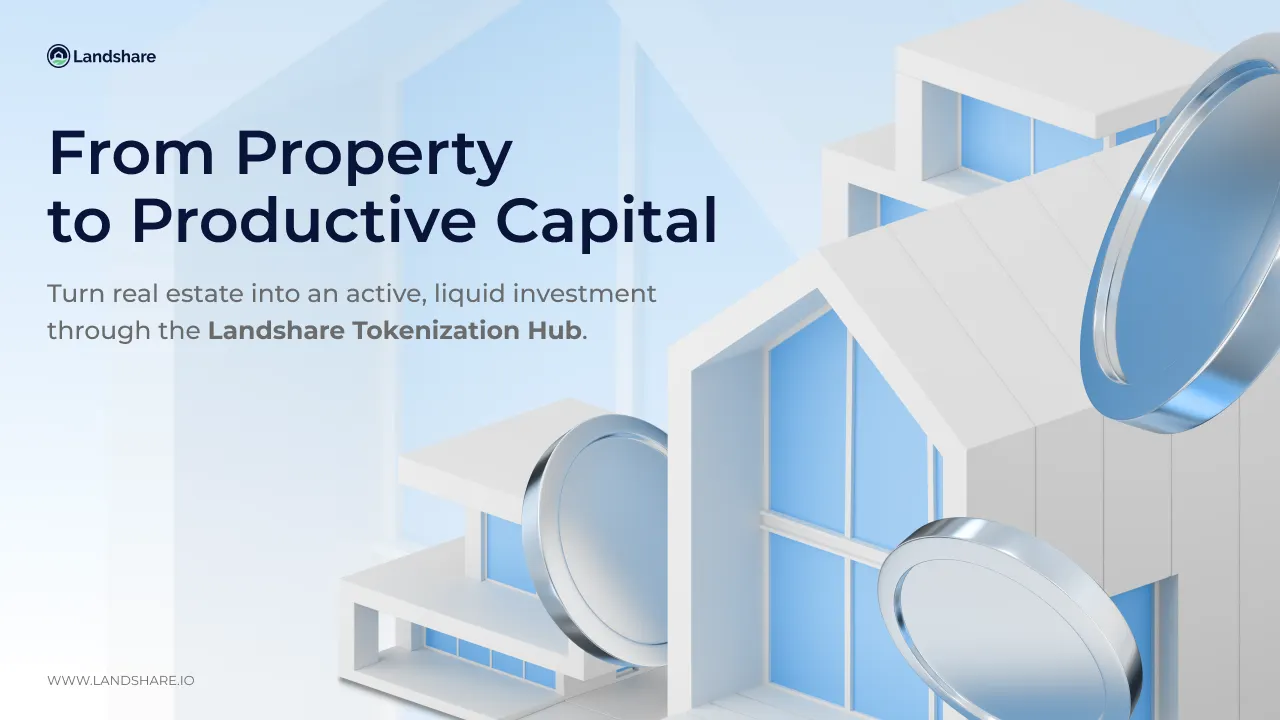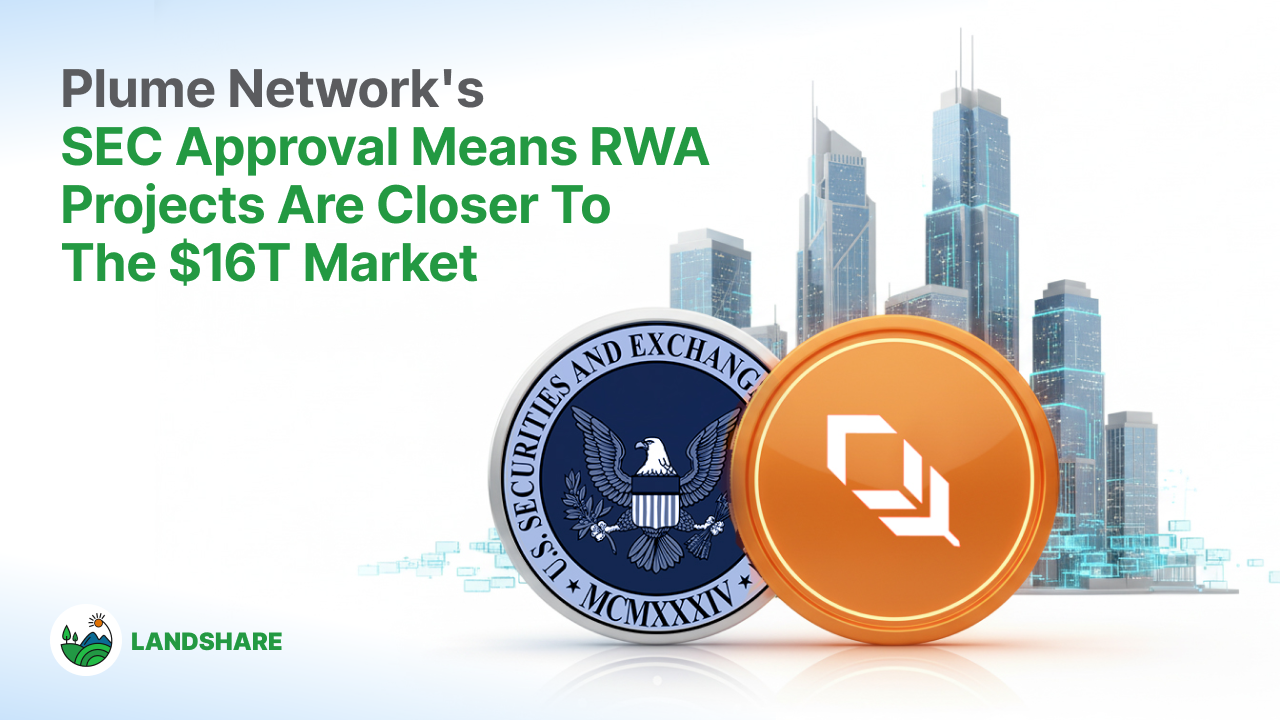Landshare Token: Utilities and Tokenomics
Landshare Team

The Landshare Token (LAND) is the native utility and governance token for Landshare. LAND sits at the heart of all platform features, serving as means of payment, access, voting, and more. It comprises one of the two tokens available to users, along with the upcoming RWA Token.
With two different tokens available, it’s vital to understand the role LAND plays in the platform and how it synergizes with the RWA Token to create a complete ecosystem. In this article, we will briefly compare LAND and the RWA Token, review a comprehensive list of LAND utilities, and take a fresh look at LAND’s current tokenomics.
LAND Token and RWA Token Compared
The Landshare platform features two different tokens — the Landshare Token (LAND) and the RWA Token (LSRWA). Although both tokens are integral parts of the ecosystem, they each serve their own unique purpose.
LAND Token Summarized
LAND is a traditional utility and governance token, similar to those available on many crypto platforms. It serves various roles throughout the entire platform and is used to access our signature features, including RWA investment, NFTs, staking, and the Landshare DAO. In short, LAND is the key to the entire Landshare platform!
LAND is an excellent choice for crypto-centric users looking for a traditional utility token. It is currently available for trade on Pancakeswap and Gate.io.
RWA Token Summarized
The RWA Token is a security token that enables real estate investment on Landshare. Unlike LAND, the RWA Token requires KYC to purchase.
Each RWA Token represents a share of a pool of US-based real estate assets. The value of each RWA Token grows proportionally with the value of underlying properties and the cash flow they produce, allowing investors to benefit by simply holding over time.
The RWA Token is an excellent choice for users looking to invest directly into real estate on the blockchain. To learn more about the RWA Token, check out our previous article Landshare RWA Token: Utilities and Tokenomics.
What are the utilities of LAND?
The LAND Token plays an essential role in all platform features, including vaults, governance, NFTs, and RWA offerings. This list covers the utilities up to and including the RWA Token update, but will continue to expand as new features are added to the platform.
Governance
The LAND Token represents voting power in the Landshare DAO, which is the primary governance mechanism for the platform. The DAO and its voters have direct control over key elements of the platform including:
- Staking Rewards: The Landshare DAO has direct control over the percentage of newly minted LAND Tokens distributed as rewards to each staking vault.
- Emission Rates: In addition to the distribution of reward tokens, the DAO can also increase or reduce the total number of reward tokens minted per day.
- Treasury Funds: 2.5% of new tokens minted are distributed to the DAO treasury. The DAO has the authority to delegate these funds for grants, burns, marketing bounties, or anything else the community can think of!
Through the DAO, the future of the platform lies in the hands of LAND holders! For more details on governance mechanics, check out our docs page.
NFT Ecosystem
Landshare Real Estate NFTs are stylized 3D NFT models of the real-world assets offered on Landshare’s platform. NFTs enable RWA Token holders to earn additional yields through a unique gamified staking system.
The NFT ecosystem utilizes the LAND Token in a number of critical ways:
- Marketplace: NFTs can be traded freely among users using LAND Tokens. Each marketplace transaction incurs a 5% fee.
- Minting: In the updated NFT minting system, a 5% LAND fee is applied to each new mint.
- Power: In order to upgrade and repair NFTs, you must generate the power resource. Additional power can be purchased with LAND through the resources tab.
- Slots: Each NFT must be placed in a slot to be considered active. Users can purchase additional slots for 15 LAND a piece.
- Premium Upgrades: Each NFT property can be enhanced using premium upgrades, which cost LAND to purchase.
RWA Fees & Payment
Investment in real-world assets is made possible through the RWA Token. However, the LAND Token plays an integral role in the process of acquiring and trading RWAs on Landshare.
In order to purchase RWA Tokens, you must make your payment in 90% stablecoins and 10% LAND tokens, pursuant to the total USD value of the purchase. For example, if you wish to purchase $1,000 in RWA Tokens, the total purchase price would be $900 in stablecoins and $100 in LAND Tokens.
With the new fixed-price liquidity pool, RWA Tokens can also be sold on demand based on the underlying asset value. When initiating these sales, a 1% LAND fee will apply. For example, a sale of $1,000 in RWA Tokens will incur a $10 LAND Token fee.
Staking
While LAND has many uses across the ecosystem, there is also an incentive for simply holding the token or providing liquidity — staking! There are 3 different ways to earn additional rewards from your Landshare Tokens through our vaults page:
- Auto LAND Staking: The recommended option for most users. The Auto LAND Vault allows you to stake your LAND Tokens and earn LAND rewards over time. Rewards are automatically reinvested, enabling you to benefit from compound interest without lifting a finger.
- Manual LAND Staking: Recommended for advanced users, manual LAND staking also generates rewards over time but does not automatically compound them. Instead, rewards can be harvested manually at any time.
- LAND-BNB LP Staking: The LAND Token can be paired with BNB to provide liquidity on Pancakeswap. After providing liquidity, you will receive LP Tokens which can be staked for LAND Rewards. LP Staking generally has the highest APR of all the different vaults, making it a great option for savvy users. To learn more about providing LP, read our guide here.
LAND Tokenomics — an Updated Look
The Landshare Token has an elastic supply, with an adjustable minting rate and dynamic burning mechanics that can affect the total number of tokens over time. However, one thing remains unchanged—LAND has a hard minting cap of 10,000,000 tokens, with each burn counting against that number permanently. Here is a basic rundown of supply at the time of writing:
- Total Supply: 4,186,897
- Circulating Supply: 4,157,149
- Supply Cap (effective): 9,981,683
- Daily emissions: ~2050
A vesting schedule applied to the first year of launch and can be viewed in the Whitepaper. However, all vested tokens have since been released into circulating supply. With the exception of the DAO Treasury reserve and burnt tokens, all minted tokens are in active circulation. The remaining un-minted tokens will be distributed over time as staking rewards (97.5%) and to the DAO treasury (2.5%).
Burn Mechanisms
The LAND Token has a number of mechanisms designed to remove tokens from supply. Because the mint rate is capped at 10,000,000 tokens, each burn effectively reduces the supply cap of LAND permanently. Some examples of burn mechanisms are:
- RWA Token Purchases: Each RWA Token purchase will be paid 10% in LAND Tokens, all of which are burned.
- NFT Ecosystem: Any tokens collected as fees for minting new NFTs, property slots, or buying power are burned.
- Elective DAO Burns: The DAO can vote to burn any number of tokens from its treasury fund, which comprises 2.5% of all tokens generated as well as Auto LAND staking fees.
Closing Thoughts
Landshare is about closing the gap between real estate and DeFi — and we achieve this through our two tokens, LAND and RWA. Each token serves a complimentary function in the Landshare ecosystem, and both are equally crucial to its success.
To learn more about the LAND Token and the platform features covered in this article, be sure to check out our collection of useful resources:
LAND can be purchased on Pancakeswap or Gate.io.
Find Landshare On:
Twitter | Medium | Youtube | Telegram | Telegram Announcements | Coinmarketcap | Zealy
Landshare October Recap
Landshare Team
October was a milestone month for Landshare – one that set the stage for the next era of on-chain real estate. From the official Landshare v2 announcement to new ecosystem updates, governance decisions, and exciting community initiatives, we’ve laid the groundwork for a future defined by growth, utility, and innovation.
This month, we introduced the framework that will redefine how investors, property owners, and DeFi users interact with real estate on-chain. Let’s recap the highlights 👇
Landshare v2 Announcement
The official unveiling of Landshare v2 signaled the start of a new chapter – one built around real utility, real yield, and real scalability.
Landshare v2 isn’t just an upgrade. It’s the foundation of a self-sustaining ecosystem where tokenized real estate finally reaches its full potential. The new system transforms stable assets into active yield-generating opportunities, seamlessly connecting traditional markets to DeFi.
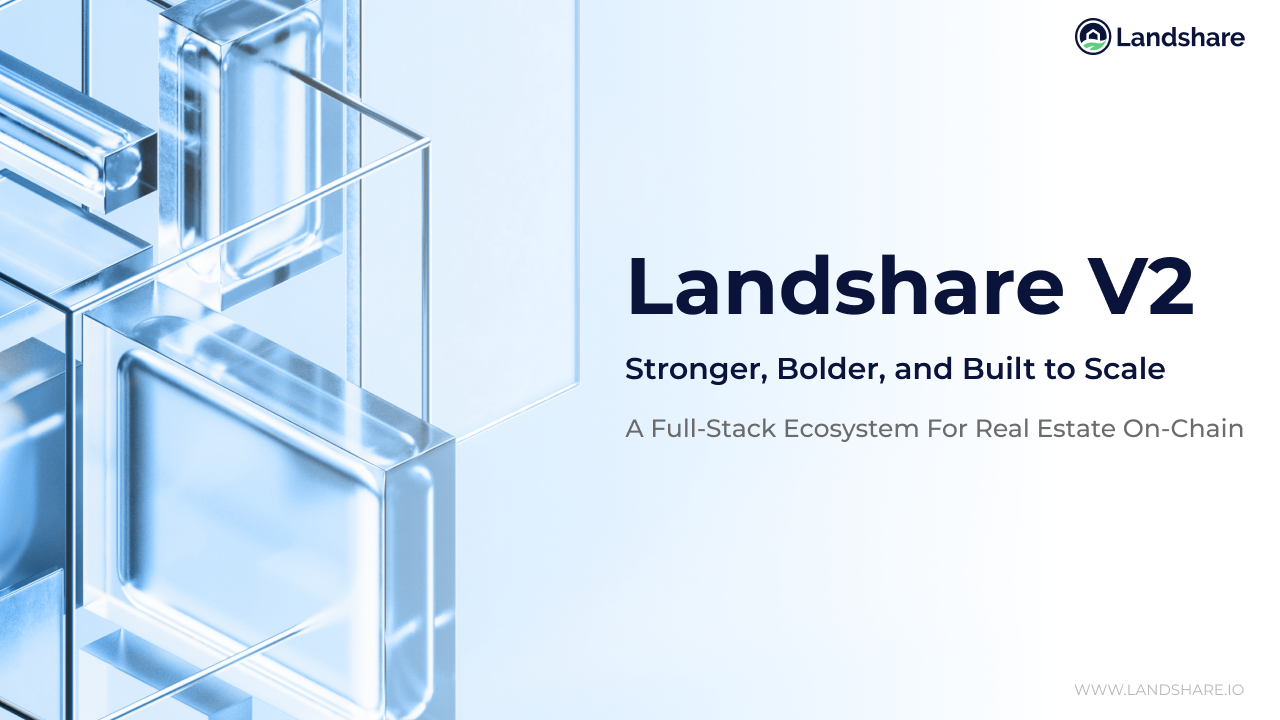
The Three Pillars of Landshare v2
In our follow-up deep dive, we explored the three core pillars that form the foundation of Landshare v2:
- The Real Asset Vault (RAV): A seamless gateway for stablecoin holders to earn real yield backed by tokenized properties.
- The Tokenization Hub: A complete solution for property owners to bring their assets on-chain.
- The DeFi Suite: Tools and incentives that amplify participation and utility across the ecosystem.
Together, these pillars create a self-sustaining growth loop, where every user and property strengthens the entire network.
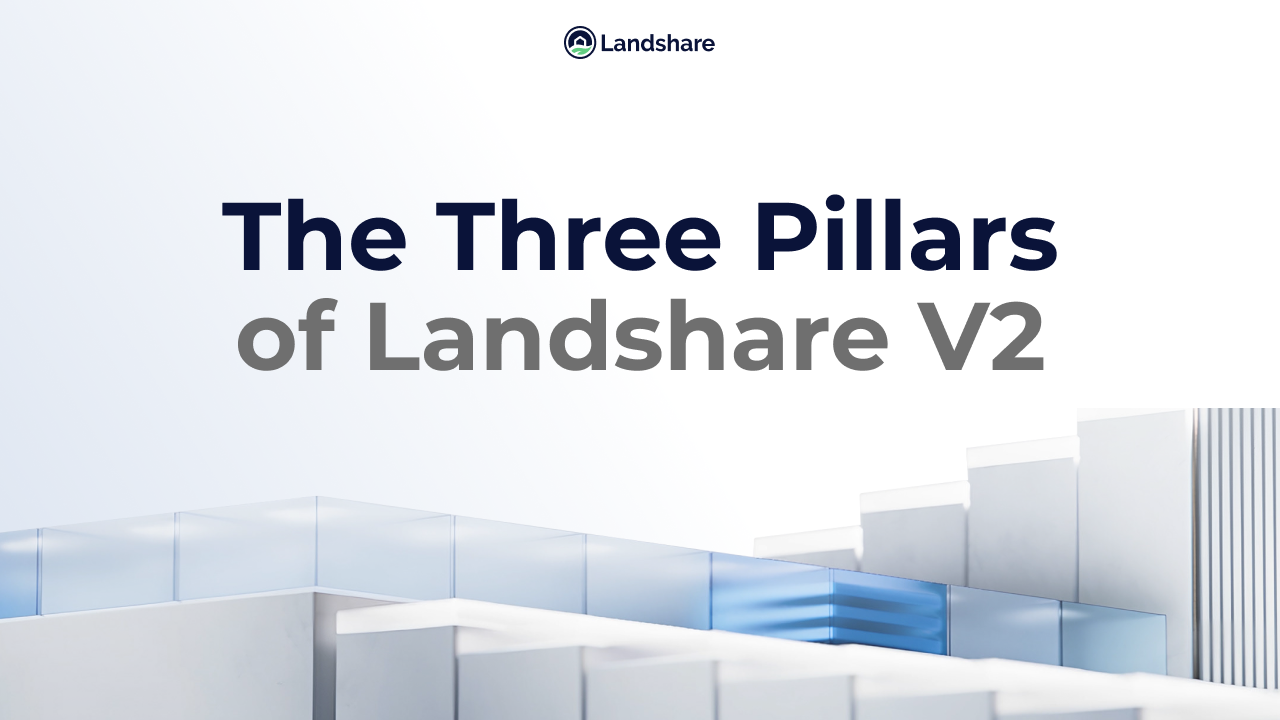
DAO Proposal Passed
In late October, the community voted to reduce LP emissions by 50% across both the LAND–BNB and LSRWA–USDT pools – with the proposal passing at 62.28% in favor.
This important step helps:
✅ Reduce daily LAND inflation
✅ Strengthen token scarcity and price stability
✅ Extend the reward pool lifespan
✅ Encourage long-term liquidity participation
The change will take effect within 48 hours of approval and marks another move toward a more balanced, sustainable economy for Landshare v2.
🗳️ View the full proposal and results
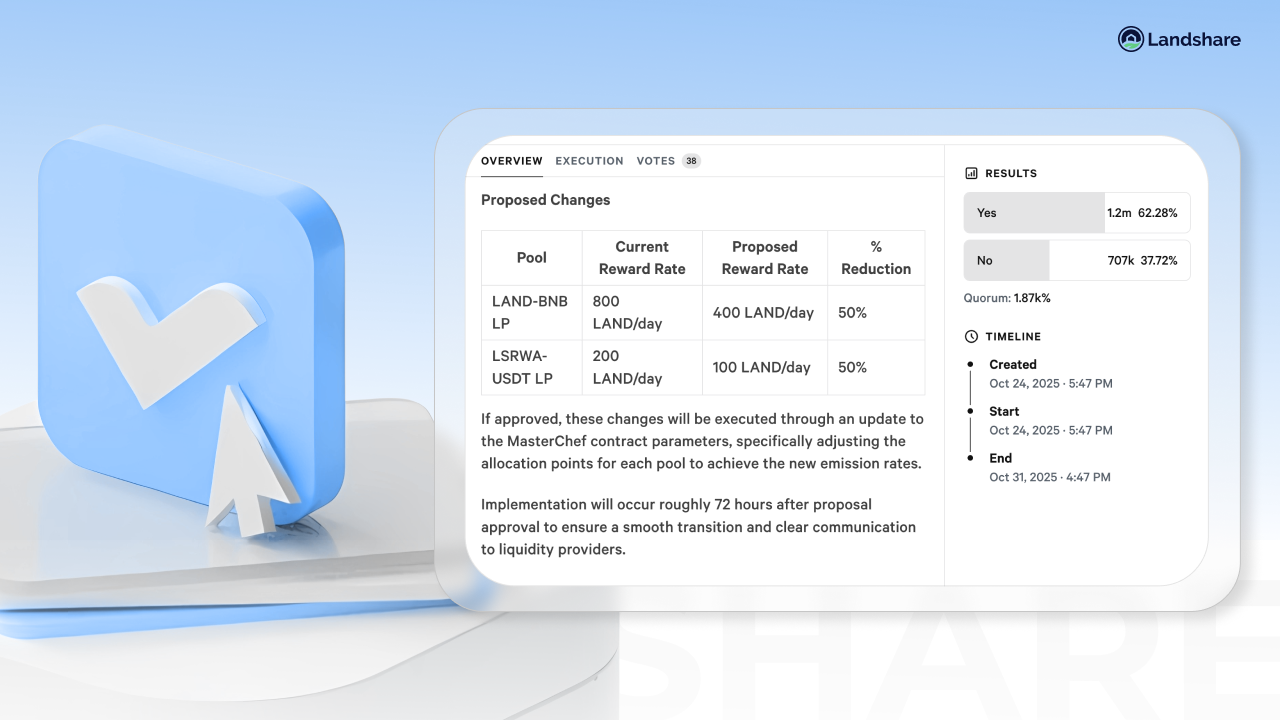
Tokenization Hub Breakdown
We released a comprehensive guide to the Landshare Tokenization Hub, explaining how property owners can now go beyond simple tokenization to access real investors, liquidity, and on-chain utility.
The Hub bridges traditional real estate with blockchain finance – creating a pathway for real-world assets to generate ongoing yield, transparency, and accessibility.

4.5M+ LAND Staked
October also marked another key milestone – over 4.5 million LAND tokens (nearly half of the total supply) are now staked in vaults. This incredible community achievement reflects growing confidence in Landshare’s long-term vision and token utility.
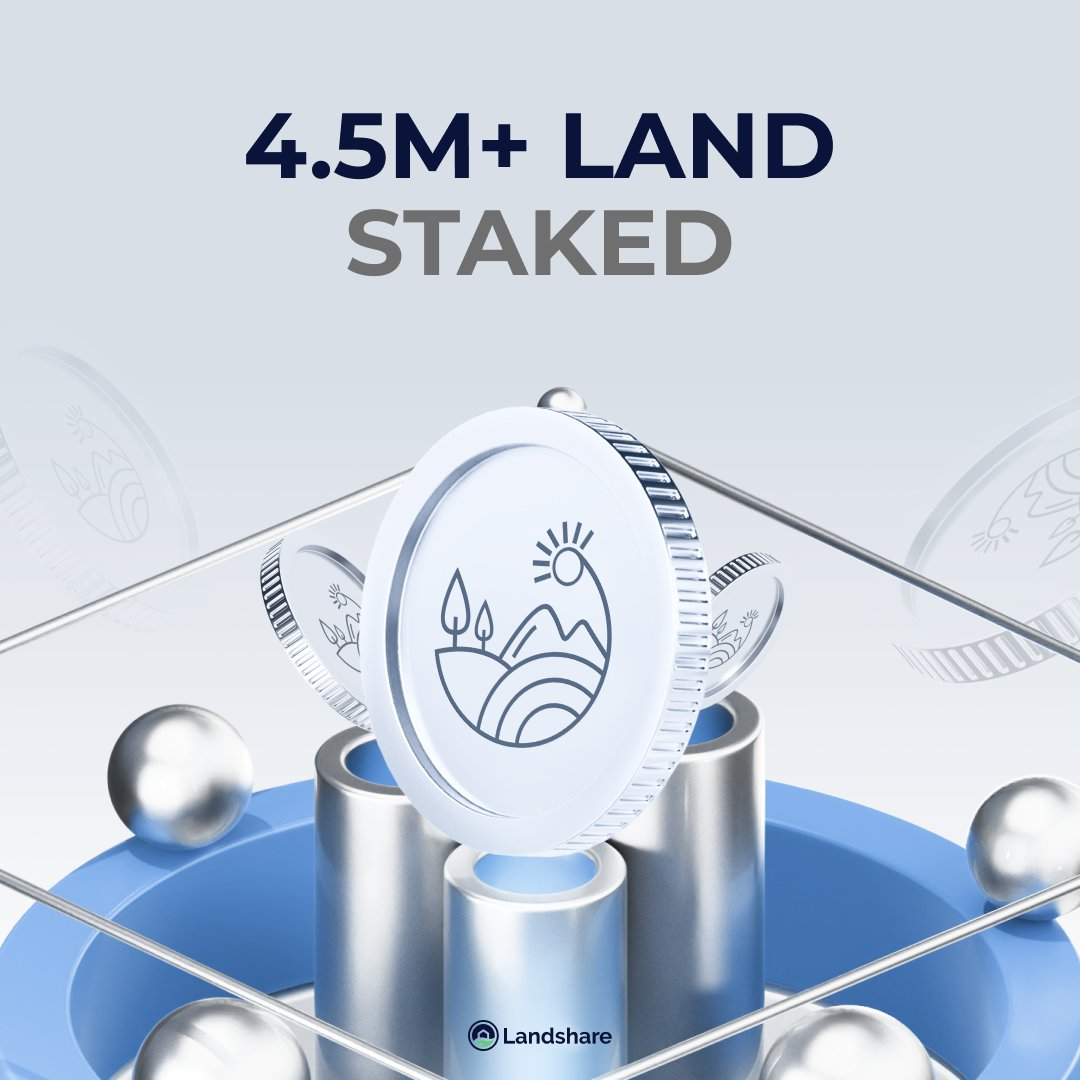
Community Townhall Incoming
We’re excited to announce our next Community Townhall, happening Thursday, November 6 at 12 PM CST or 6 PM CET on X Spaces!
Join Jordan (CEO), Travis (Co-Founder), and Ivan (CMO) as they discuss everything happening with Landshare v2, recent DAO proposals, and take your questions live.
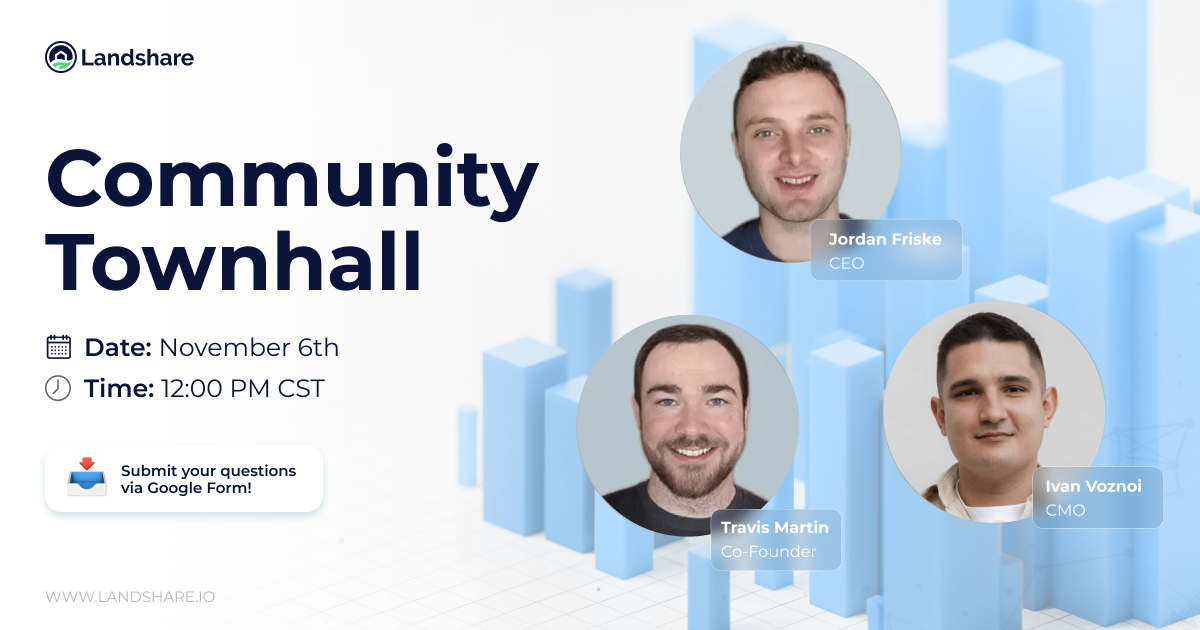
Looking Ahead
With Landshare v2 on the horizon, the foundation is set for a new phase of growth and adoption. In the coming weeks, we’ll be sharing more details on the RAV launch, the Points Campaign, and other major milestones driving our ecosystem forward.
Stay tuned – the future of real estate is being built on-chain, and we’re just getting started.
Tokenization Hub Breakdown
Landshare Team
Real estate tokenization has been a buzzword for years. Yet in practice, most projects have failed to move beyond press releases and empty promises. Too often, blockchain has been used as a veneer to package illiquid or low-quality assets, leaving investors with tokens that serve little purpose and property owners with no meaningful results.
Without investors, liquidity, or secondary markets, tokenization becomes little more than an on-chain spreadsheet — a digital record of ownership that no one can trade or invest in. For property owners, that means time and money spent “tokenizing” without achieving key goals: raising capital, expanding visibility, or unlocking value.
A Smarter Path Forward
For real estate tokenization to truly work, it needs to deliver tangible investment outcomes. After years of building and refining on-chain real estate products, Landshare has developed a model designed to do exactly that.
The Landshare Tokenization Hub transforms tokenization from a passive concept into an active investment process — connecting high-quality properties with real investors, liquidity pathways, and a live blockchain economy.
The Tokenization Hub Solution
Most platforms stop once a token is created. Landshare’s Tokenization Hub goes further , offering a complete pathway for property owners to bring their assets on-chain and immediately engage investors.
Each project is structured for success from day one, with:
- Customized tokenization models tailored to each property
- Transparent fundraising mechanics with defined soft and hard caps
- Built-in integration with the broader Landshare ecosystem
By connecting directly to Landshare’s existing network of investors and DeFi infrastructure, offerings can attract participation as soon as they launch. Once a fundraising goal is met, property tokens are deposited into the Landshare RWA Pool, linking them to ongoing liquidity, yield mechanisms, and secondary market exposure.
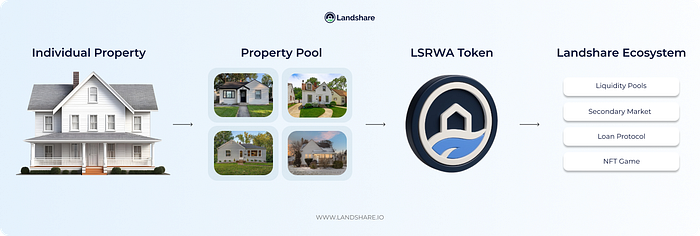
Why This Model Delivers Real Results
Where others leave property owners to manage marketing, compliance, and liquidity alone, the Tokenization Hub handles these as part of a unified process. This integration dramatically increases the likelihood of meeting fundraising goals and sustaining long-term engagement.
Integration with the Landshare RWA Token (LSRWA) is central to this model. Rather than isolated tokens with no market, each property becomes part of a shared, liquid environment that generates yield and investor participation. Individual assets can still be represented, extracted, or traded independently when needed.
For example, a multifamily property owner might tokenize 20% equity to raise $500,000 on-chain, connect the asset to the RWA Pool for ongoing yield, and maintain full transparency for investors — all within a compliant, accessible framework.
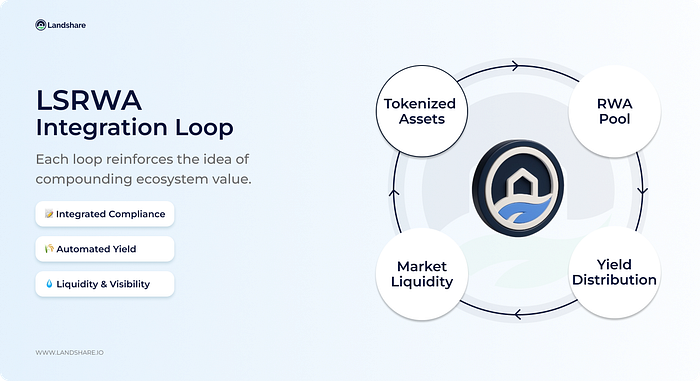
How It Works
- Tokenize the Property: Landshare collaborates with property owners to create a digital representation of equity, income rights, or hybrid participation.
- Launch the Offering: The property is listed on the Tokenization Hub with defined terms, caps, and transparent investor access.
- Fundraising & Validation: Investors participate directly on-chain. Once the soft cap is reached, funds are secured and the offering is finalized.
- Ecosystem Integration: Tokens are deposited into the Landshare RWA Pool, and investors receive LSRWA tokens representing pooled value and yield potential.
- Ongoing Value Creation: Property owners gain lasting benefits through liquidity, visibility, and investor engagement. As new assets are added to the pool, owners can rebalance between equity and cash, making real estate a more dynamic and liquid asset than ever before.

Built for Real-World Impact
The Landshare Tokenization Hub is more than a technical service — it’s a complete ecosystem designed to make real estate investment active, liquid, and accessible.
For property owners, it offers a streamlined way to raise capital and connect with global investors.
For investors, it provides exposure to yield-generating, on-chain assets backed by transparent real-world value.
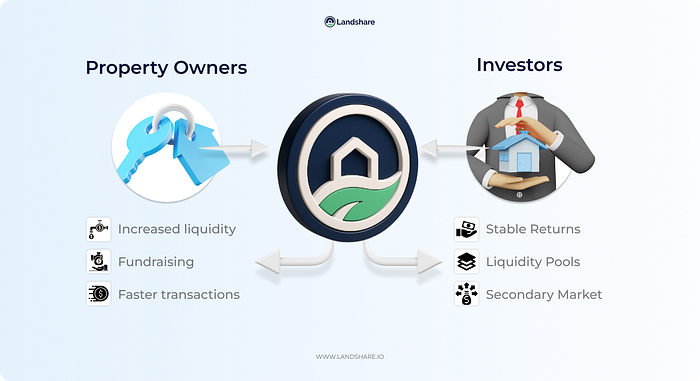
In an industry crowded with static tokens and overhyped promises, the Tokenization Hub delivers what tokenization was always meant to achieve — real outcomes, real liquidity, and real-world results.
🏡 About Landshare
Landshare is a tokenized real estate ecosystem that enables seamless investment in real-world assets on the blockchain. With Landshare, you can own a share of a real-world property simply by holding our RWA Tokens ($LSRWA). Our platform offers a secure, transparent, and efficient way to invest in real estate without traditional barriers.
- Website: landshare.io
- Twitter: @Landshareio
- Community: t.me/landshare
Plume Network's SEC Approval Means RWA Projects Are Closer to the $16T Market
Landshare Team
On October 6, Plume Network announced on its social media that it had been approved to be an SEC-registered transfer agent. This is a big milestone for the RWA industry, signaling that the traditional financial system is welcoming tokenized assets.
Transfer agents basically manage important back-end work and are the official record-keepers for securities issuers. So, essentially, they maintain shareholder registries, record ownership changes, issue certificates, and handle other corporate actions.
Plume’s approval means these critical functions can now be managed on-chain for tokenized securities. This is a pretty big deal, as it gives Plume and its users formal regulatory standing under U.S. law for on-chain securities.
Experts believe that this approval can boost the global RWA market, and top players like Landshare can benefit from it due to the increased regulatory clarity.
Why is the SEC’s Approval Important for Plume Network?
So, first, understand the roles of a registered transfer agent to get a better understanding of its importance.
In traditional finance, a transfer agent is usually a company or bank that tracks who owns a company’s securities and facilitates trades. They ensure every share transfer, stock split, or dividend payment is accurately recorded and reported. Now, let’s understand how this traditional role will work in the world of blockchain.
Post Link
By replicating these roles on-chain, Plume’s platform can securely log every token sale or dividend distribution in an immutable ledger, while also syncing with regulators. As Plume explains, its transfer-agent protocol will “link cap tables and reporting directly to SEC and DTCC systems”.
This means tokenized equity and debt on Plume can behave like traditional securities, but will be managed better with the help of blockchain technology.
Plume’s CEO believes that this regulation “exists to protect investors’ rights as shareholders,” and Plume’s on-chain solution is meant to simplify the processes under that framework.
Its Impact:
Experts believe that the registration will open up several doors for the RWA market because of the ‘trust factor’. Being registered means there are no risks as far as legality is concerned. When an industry or its top player receives a green flag from the government regulatory agencies, institutional capital follows.
BlackRock, Fidelity, JP Morgan, etc., are already looking to build blockchain-based products. This will further invite them to join the RWA growth story and possibly super-boost it.
Moreover, another important benefit is that tokenized securities can now flow through compliance obstacles. This means issuance times can be cut from months to weeks with the help of smart contracts. Similarly, on-chain dividends and ICOs can enjoy the same legal protections as Wall Street offerings.
What Does This Mean For The RWA Market?
Plume’s win comes at a time when analysts are already forecasting a massive growth in tokenized RWAs over the next decade. Institutions now value tokenization as a way to digitize everything from private credit to real estate. Also, the numbers are pretty optimistic as well.
A Boston Consulting Group report estimated the global asset-tokenization market could reach about $16.1 trillion by 2030. The industry has already grown by almost 380% in the past three years. To put things into perspective, today’s entire crypto market cap is smaller than those figures. Even some of the more conservative forecasts still show multi-trillion growth.
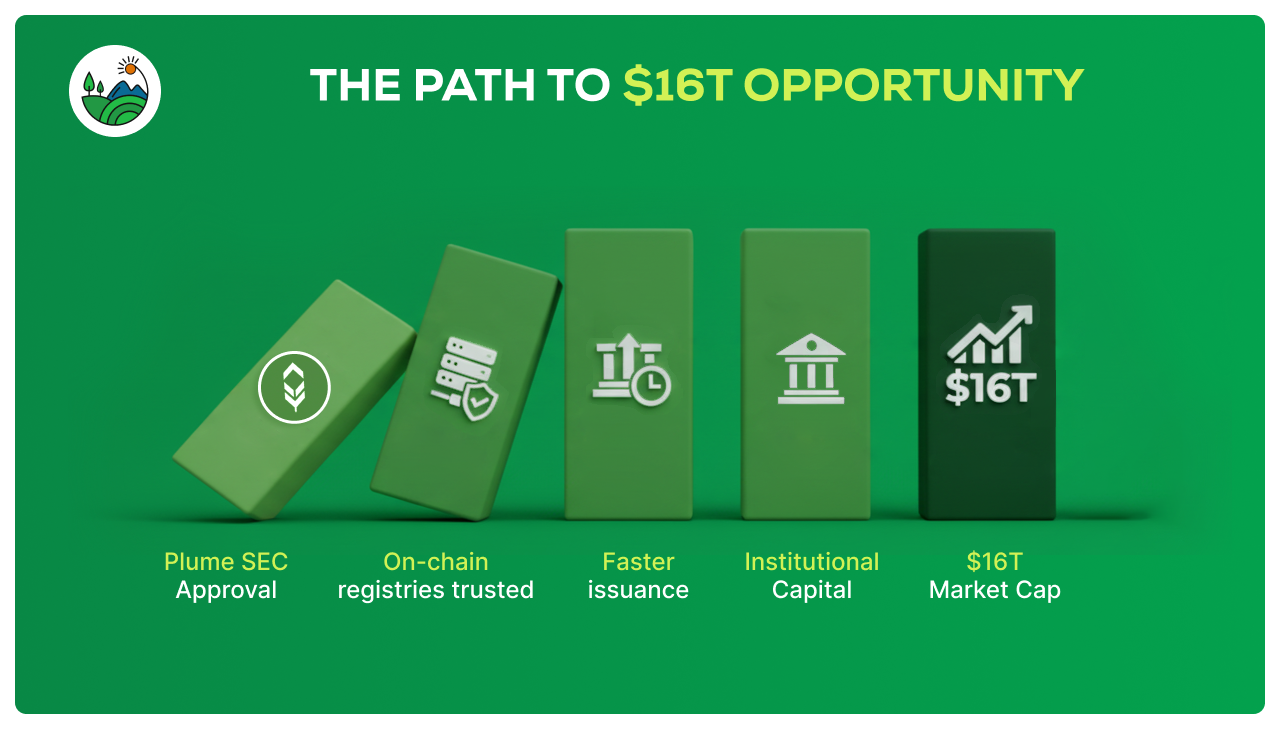
If these estimates can materialize in the days to come, RWA is well-positioned to be one of the largest markets in the world of modern finance.
Moreover, the external conditions are favoring this industry. Governments and regulators worldwide are creating proper frameworks. For instance, Asia-Pacific markets are running pilots for digital bonds and crafting standardized rules for security tokens.
These developments and the excitement of retail investors in this category build confidence that the $16T opportunity is actually very real.
How Will Landshare Benefit From This?
Landshare stands at the forefront of benefiting from this opportunity because of its early entry and real-world utility. This is very important as institutions seek new projects that have use cases that can help them capture a considerable market share.
Moreover, Landshare already operates as a compliant RWA platform. For instance, each Landshare RWA Token (LSRWA) is a security token representing fractional shares of a U.S. real estate portfolio, and buyers must pass KYC/AML checks.
The fact that regulators are now approving on-chain transfer agents shows the industry’s efforts are finally paying off. Here are some more factors that can help Landshare be one of the top RWA contenders:
1. Regulatory Credibility: Plume’s SEC status essentially means that tokenized securities can operate within established rules. Landshare’s approach aligns with these principles. So, investors can be assured that their projects sit within a legal framework designed to protect shareholders.
2. Investor Confidence: Every step toward clear regulation lifts confidence. The recently passed GENIUS Act, the SEC’s staff statements on liquid-staking, and the Trump administration’s overall outlook towards the crypto market have been fairly positive.
Similarly, Plume being approved as a SEC-registered blockchain transfer agent tells retail and institutional investors that projects like Landshare aren’t mere experiments. They’re rather a part of a regulated financial evolution.
Moreover, it means regulators see value in on-chain tokens, and that kind of signal helps legitimize the space Landshare operates in.
3. Landshare’s Own Progress: Landshare isn’t about hype. It is rather focused on delivering value from day one. The project has already sold four houses on the BNB chain. It is also providing consistent rental returns to the investors in its properties.
Moreover, the team remains focused on delivering stable, compliant returns from real estate growth.
Conclusion
So, now we know that the recent news was about more than just Plume Network being approved by the SEC to be a transfer agent. It rather has a much bigger impact on the RWA market as a whole.
While the industry continues to grow, for Landshare, it is the right time to innovate further and add more value to consumers’ lives.






